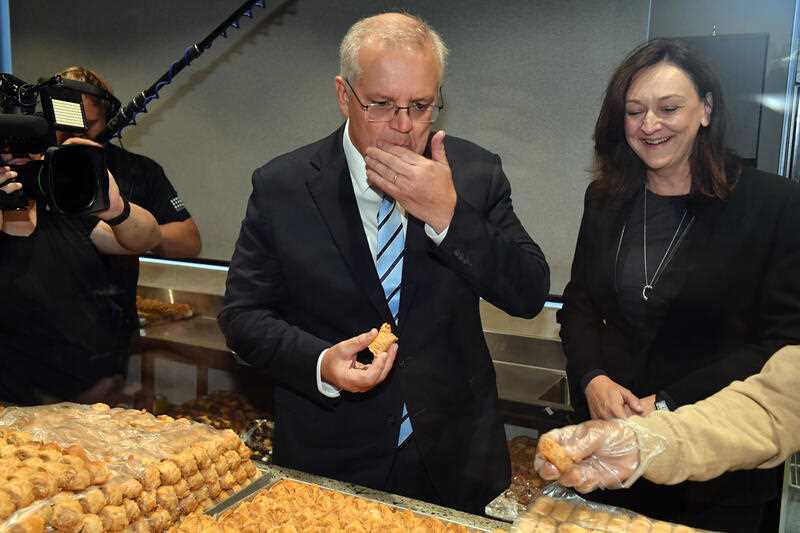Small businesses are key to the Liberal-Nationals’ economic plan while Labor is hitching its success to more jobs in the clean energy sector.
Future small business owners are being promised good economic conditions to set up shop, as the prime minister continues to play up the government’s fiscal credentials.
But Labor leader Anthony Albanese is pitching a clean energy economy as part of the opposition’s commitment to a 43 per cent emissions reduction by 2030.
Scott Morrison says 400,000 new small businesses will be created over the next five years if his government is returned at the May 21 election.
But he did not have the “magical” ability to lift wages and lower the cost of living.
“I don’t believe I have a magic pen that makes wages go up or makes prices go down,” he told reporters while campaigning in the western Sydney electorate of Parramatta on Thursday.
“Anthony Albanese is walking around in this election, pretending that he has some special magical powers to make wages go up and costs go down.”
Yet Labor says the prime minister’s small business pledge is not as ambitious as he is trying to claim.
As part of Labor’s powering Australia plan, more than 600,000 new jobs will be created by 2030, with five out of six of those in regional Australia.
“Climate change represents a jobs and economic growth opportunity for Australia,” Mr Albanese told reporters in Sydney.
“Only Labor can end the climate wars and what we need is to do just that so businesses can have the certainty to invest confidently going forward.”
The coalition is offering lower taxes, less red tape and energy efficiency to encourage more small businesses to set up shop, building on its efforts to support a similar number in the past five years.
“The energy and drive which has got us through this pandemic, which we’ve backed in as a government … will ensure the Australian economy continues to create the jobs,” Mr Morrison said.
Yet the peak body for small businesses in Australia says the coalition’s plan builds on existing initiatives but does not provide a clear path to address future challenges.
“We are calling for policy that will address the next two years of growth, because small businesses are ready to thrive and grow,” Council of Small Business Organisations Australia Alexi Boyd told AAP.
“What we need is encouragement for them to continue that, which means removing some of the pain points including industrial relations and competition reform.”
Government policy to make it less complicated to run a business, and easier to hire someone and comply with tax and super requirements are some of the changes the council would welcome.
Meanwhile, the opposition leader stressed the need for economic reform while making his election pitch to industry leaders in a speech to the Australian Chamber of Commerce and Industry.
“A country cannot keep drawing from an old well, because the well eventually dries out,” he said.
“Australia needs a new playbook to seize the future.”
Among the measures Mr Albanese proposes is universal child care, which he says will support workforce participation.
Earlier this week, the Reserve Bank of Australia raised interest rates for the first time in almost 12 years, taking the cash rate from 0.1 per cent to 0.35 per cent.
The rate hike has put cost of living pressures at the centre of the election campaign, with both leaders claiming they would be better at managing the financial squeeze being felt by Australian households.
By Maeve Bannister and Andrew Brown in Canberra, AAP



